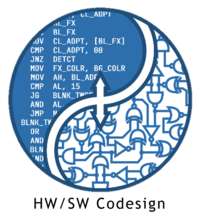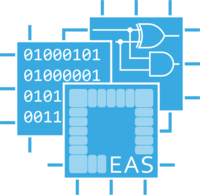Hardware/Software Codesign

You can find more information about the working group here.
Currently are no student thesis topics available.
Industrial Informatics

You can find more information about the working group here.
- Cybersecurity Norm TISAX for SMEs
- Digital Badges and Certification System
- Automotive Cybersecurity Assessment Tool Feature
- Spasm detection in gait trainer based on force measurements
- Gait Analysis using smartsoles
- Adaptive testing of embedded real-time systems
- Lane Detection: Unleashing the Power of Raspberry Pi in Automotive World
Embedded Learning and Sensing Systems

You can find more information about the working group here.
- Efficient dynamic neural networks on AR glasses
- Efficient machine learning on AR glasses
- Model folding on large vision models
- Parameter-efficient Adaptationfor Object Detection Models on Mobile Devices
- Real-world Challenges for Adversarial Patches in Object Detection
- Folded Object Detection Models
- Does Merging Channels Amplify Bias in DNNs?
- Integration of Spatiotemporal Data into LLMs
- AI-Driven Vehicle Data Integration
Low-Power Embedded Networked Systems

You can find more information about the working group here. Note that you can get paid for carrying out most of the projects/theses in our group.
- Speaker Distress Detection using Low-Power Embedded IoT Devices
- Centimetre-Accurate Ranging in Non-Line-of-Sight Conditions
- Simulating the Performance of IoT Protocols using Data Collected on Real-World Testbeds
- Towards Location-Aware BLE Devices
- Evaluating the Localization Performance of Bluetooth 6.0's Channel Sounding
- Bluetooth LE Audio: The Future of Wireless Audio?
- Are Implicit Certificates still Necessary? The Future of IoT Security
- Enhancing Low-Power Wireless Protocols based on Concurrent Transmissions
- Towards a Battery-free IoT
- Low-Latency and High-Fidelity Wireless Audio using UWB Technology
Leveraging AI Processors for Machine Learning on MicrocontrollersRobust Speaker Recognition for Deeply Embedded IoT DevicesUsing the Next-Generation UWB Devices to Design Location-Aware IoT ApplicationsDetecting and Mitigating Coexistence Problems through RF Spectrum AnalysisTowards BLE-enabled PacemakersBuilding a Low-Power Wireless "Smart Office Labelling System"
Cognitive Products

You can find more information about the working group here.
- Understanding Safety through Image-to-Text LLM
- Application of LLMs in Automated Testing of PLC Code
- Semantic Monitoring and Copilot for Test drives
- Cognitive safety for dynamic industrial environments
- Generating Safety Concepts with Large-Language-Model

